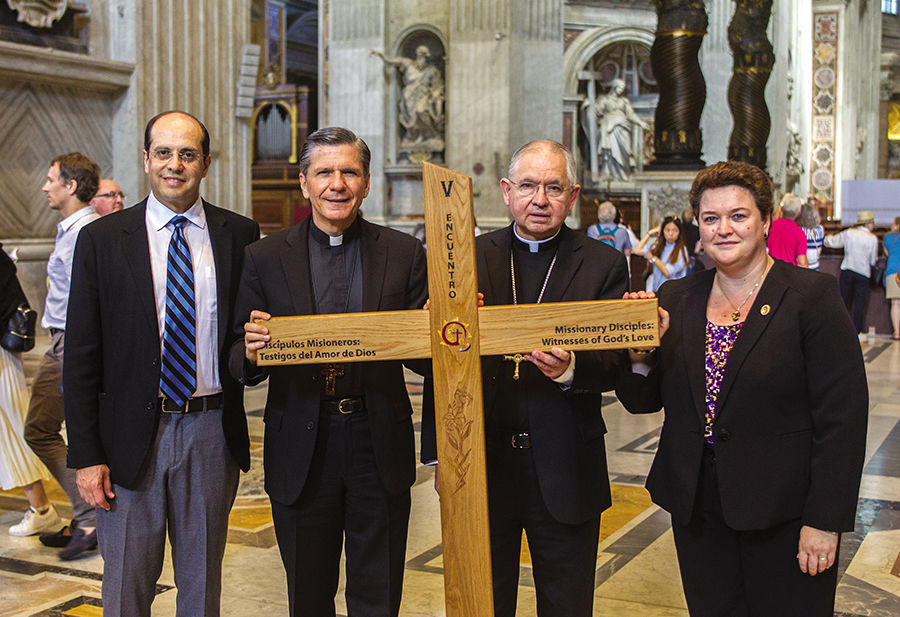Latino Catholics are ready to assume greater leadership roles in the Church — a fact that was on display at the Pasadena Convention Center Jan. 27, where some 1,000 Latino Catholics gathered as the Archdiocese of Los Angeles kicked off the V Encuentro (Quinto Encuentro).
The Encuentro movement was started by the nation’s Catholic bishops in 1972 to focus on Latino integration and dialogue. Today, with Latinos approaching a majority in the U.S. Church, the Encuentro movement now seeks to encourage leadership and missionary discipleship from a diverse and established Latino community.
“The Latino community is such a vibrant and vital part of our Church in the United States, where the faith is truly alive,” said Carolina Guevara, chief communications officer for the archdiocese, who noted that 70 percent of the Archdiocese of Los Angeles is Latino. “Latinos are not just asking how can the Church serve them, but how can Latinos also serve and be the disciples that go out and share the message.”
Most of the participants at the Pasadena event have undergone a three-hour training session, where trainees pray together and learn about the history and vision of the Encuentro movement.
When the movement first took off in 1972, the Latino community was coming out of the shadows to express its needs, aspirations and contributions. The next events, one in 1977, 1985, 2000 and 2006, focused on addressing its needs and understanding its identity, while welcoming and showing solidarity with other cultures and traditions.
After the initial training session, participants are invited to a series of reflections that take place during a daylong event over the course of five consecutive weeks. These five sessions delve into the process of reflection, evangelization and consultation, which prepares participants to better evangelize.
“We assume that they have a personal encounter with Jesus Christ, and so they come to reflect on how they can become disciples and become more aware that the love of God calls us to a life of service ... especially to those who are poor and in need,” said Ernesto Vega, the Spanish coordinator for Adult Faith Formation at the archdiocese.
Vega said the attendees of these reflections experienced their own “moments of grace” when, through the training, they realized the barriers they had placed in the way of helping others. One participant told him that instead of showing love and concern for his college-aged son, he had instead scolded him for his mistakes, which drove him further away.
Vega stressed that the Encuentro movement wants its members to meet people where they are, avoiding the Bible-thumping approach, in favor of listening to the needs of others. Evangelization can take place only when real friendship has been established, he said.
Father Allen Deck, SJ, pastoral theologian at Loyola Marymount University, said this pastoral approach is essential to the Encuentro movement. “If we are going to be pastoral we do not begin with rules or regulation, or teachings, or doctrine, or even the Church’s tradition. We begin with the reality that is in front of us: the needs of the community, where they are, what is going on in their lives, etc.”
Another key feature of the movement is social change through grassroots organization. “It has a high regard for bringing about change and reform in the Church from the bottom up and not just from the top down,” Father Deck said, but quickly added that this push for social change must come from a strong spiritual life. He referenced the Spanish word “mistica,” which, he says, “refers to an underlying spirituality that motivates and moves people.”
Father Deck recognizes the many challenges that the Latino community has faced and continues to face in the US: weak law enforcement, discriminatory practices in banking loans and immigration concerns. But he feels strongly that the ongoing grassroots movement for social change is only making the Latino community better leaders for greater things in the future.
“Despite the fact that these have been very difficult or very harrowing times for the Latinos, they are gaining experience,” he said.
“They are gaining knowledge of how the American system works, of what their rights are. They are organizing themselves to respond,” he added, “so, something good comes out of this period and, of course, the Encuentro nurtures this spirit of participation that calls forth the Hispanics to leadership.”
Father Deck said the demographic statistics of Hispanics clearly reinforce the findings of Harvard sociologist Robert Putnam, who said Latinos are “the leading indicators of the Catholic Church’s future in this country.”
Father Deck couldn’t agree more. “What is at stake here is the future of the Church,” he said. “The main place that the Catholic Church is going to get leaders is Latinos, and if it doesn’t create Latino leaders, it’s not creating leaders.”
The next Encuentro meeting will be at the regional level in the Diocese of Fresno, where California, Nevada and Hawaii representatives (an estimated 2,000 participants) will gather. From there, the national meeting will take place in Houston with representatives from all of the U.S. regions. The regional and national conferences will then each submit a document of findings to the U.S. bishops in Washington D.C., where the conversation will continue.
“Archbishop José H. Gomez,” Vega said, “is really supporting this event and making sure that we continue the vision after we submit the documents to Washington D.C., that it’s not just another event, that we continue fostering the vision with new leaders in the Church.”
Interested in more? Subscribe to Angelus News to get daily articles sent to your inbox.

